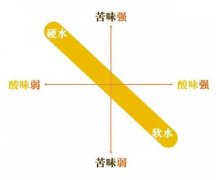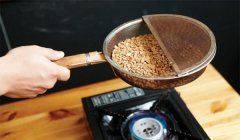What is the special water for coffee? What's so special about the water that makes coffee? How much is the coffee water ppm worth?

Professional coffee knowledge exchange more coffee bean information please follow the coffee workshop (Wechat official account cafe_style)
Effect of Water quality on Coffee SCAA specifies the TDS value of water
Christopher H. Hendon, a postdoctoral researcher in chemistry at the Massachusetts Institute of Technology, overheard a conversation between two frustrated baristas in a coffee shop near his British alma mater a few years ago.
They have some doubts about good coffee. Boutique coffee shops can control the producing area, baking method, grinding degree and brewing method of coffee beans, but there is a problem that they often overlook, but this is an important factor that can determine the quality of a cup of coffee.
That is: water
Have you ever heard of water for brewing coffee? Which kind of coffee should you choose, soft water or hard water?
Of course, roasted coffee beans will also have citric acid, eugenol and other compounds. These compounds vary with different roasting degrees and different beans, resulting in different flavors of each coffee.
To prove the effect of water quality on coffee, Hunton and British champion baristas Lesley and Maxwell, who won the 2015 British championship, boiled the same coffee beans with different water quality, and the results confirmed their prediction.
Most people know that there is a difference between "hard" (all like magnesium minerals) and "soft" (distilled water falls into this category). Water also has its own complexity! When you turn on a tap, you get not only H2O, but also a lot of other substances, such as magnesium and calcium ions.
The point is: some compounds in hard water are "sticky" and will cling to the compounds in your coffee when they come across your coffee-making tools.
Magnesium is particularly sticky, and if water contains a lot of magnesium, it will give coffee a stronger taste and higher caffeine. However, hard water also contains more carbonate, which Hunton found may be the source of the more bitter taste of coffee.
Have you ever heard of water for brewing coffee? Which kind of coffee should you choose, soft water or hard water?
However, while using hard water to make coffee is a bit risky, it ultimately depends on which mineral contains the most. Hunton found that soft water tends to have a lot of sodium, but it doesn't taste sticky (whether it's good or bad). This means that if you use "hard water" containing more magnesium instead of "soft water" to brew exactly the same beans, the coffee brewed with "hard water" will have a stronger flavor. The findings were published in the Journal of Agricultural and Food Chemistry and ended up with a book, which explains why coffee lovers need to worry about more than just beans.
The range of soluble matter (TDS) in water should be between 100 and 250ppm. The more TDS, the lower the extraction rate when brewing coffee, on the contrary, the less TDS, the higher the extraction rate.
This means that many friends over-pursue the extraction rate, resulting in over-extraction or insufficient extraction. However, Hunton made the theory more detailed.
All in all, 98% of a cup of coffee comes from water, and there are many reasons for determining whether this cup of water is suitable for coffee.
But you are not Hunton, and the average coffee lover is not a chemist. Every time you want to brew coffee with perfect water quality, you can't easily change the composition of the water quality. According to Hunton's article, it is really not recommended to use distilled water to make coffee. Coffee made from pure water tends to taste dull and lack a sense of hierarchy.
Have you ever heard of water for brewing coffee? Which kind of coffee should you choose, soft water or hard water?
Have you ever heard of water for brewing coffee? I heard you right. It's just water!
It has recently been reported that high-end coffee beans launched by Starbucks and US boutique coffee chain Blue Bottle can cost between $10 and $13 an ounce (28g). This partly reflects the promising market for coffee enthusiasts who are willing to spend a lot of money to make coffee.
In addition to coffee beans, someone came up with the idea of water and launched a water brand Aquiem, which is specially used to make coffee. The price of a box of water (12 boxes, 1 liter each) is $25.68. The water is produced in Miami and is packed in Tetra Pak.
Have you ever heard of water for brewing coffee? Which kind of coffee should you choose, soft water or hard water?
"98% of a cup of coffee is water," says Frank Manale, founder of Aquiem, who believes that water can largely influence the quality of coffee. As a coffee lover, he would take his favorite beans with him when he was on a business trip, but found that he went to another place. Because of the different water quality, the taste of coffee was different from that he drank at home. He felt that tap water and ordinary bottled pure water could not meet his needs.
Aquiem's water is first filtered and softened to remove all the minerals (zinc, lead, chlorine and fluoride) from the water, and then they add some minerals that enhance the taste of coffee: magnesium, potassium and small amounts of calcium. Although it is designed to make coffee, you can also use it to make tea or drink it directly.
Founder Frank Manale previously worked as an environmental consultant and majored in water-related issues: pollution assessment and remediation of soil and groundwater. Another startup member is Ralph Henn, who has 14 years of experience at Community Coffee, a coffee company in Louisiana.
They began research and development of Aquiem water at the University of Louisiana six years ago, and the "coffee water" went on sale in January this year. Aquiem water is currently sold in single boxes in 18 supermarkets in Louisiana. Aquiem also plans to enter a larger supermarket chain, which is in talks with supermarkets such as Whole Foods. Aquiem is also available on its website. They may enter Amazon in the future.
In addition, they also plan to launch a single bottle of smaller water to meet people's need to drink a small cup or two. In addition to the consumer market, Aquiem will launch larger packages of coffee water in the future, which will be sold to cafes. B2B may be a good direction, considering the large number of people spending in cafes.
Have you ever heard of water for brewing coffee? Which kind of coffee should you choose, soft water or hard water?
Which should you choose, soft water or hard water?
The so-called hardness of water refers to the total concentration of calcium and magnesium ions in water, the lower concentration is soft water, on the contrary, the higher concentration is called hard water.
Most of the tap water in our country belongs to hard water, and the water in the north is harder than that in the south.
Generally speaking, most of the so-called "famous water" or "mineral water" have high hardness in order to make it feel delicious, while coffee is counterproductive. Hard water will cause coffee to form delicious caffeine or good bitterness ingredients to extract and decompose.
Have you ever heard of water for brewing coffee? Which kind of coffee should you choose, soft water or hard water?
Summary
Instead of thinking about "what kind of water is best for coffee", use "what kind of water is the best for brewing coffee?" To make a choice. Whether to use soft water or hard water for brewing coffee should be chosen according to personal "preference".
People who like the smooth taste and sour taste of coffee can use soft water to brew coffee, and the aroma of beans will be more obvious when brewing. People who like the bitter taste of coffee usually prefer to use hard water to brew, and the aroma of beans is weak when brewing. In addition, between hard water and soft water, there are other kinds of water quality, including medium-hard water and very hard water. Do not use mixed brand mineral water or mixed brand bottled water, once there is a strange smell in the water, it will be more obviously magnified in the coffee.
If you use the water from the faucet, please pay attention to the following points: when the stench of chlorine used for disinfection is too strong, you should avoid drinking it. When the meaning is too strong, it can be slowly heated to make it boil, so that carcinogens can be removed. Don't use secondary boiling water to make coffee. Try to avoid the first tap water in the morning and the water taken the day before. Activated carbon filter and the use of water purifier are also good methods.
There are also abundant kinds of mineral water all over the world. Therefore, it is best for everyone to choose a high-quality water source suitable for brewing coffee. Teacher Lin, PTN Coffee Studio, suggested that it is OK for enthusiasts to evaluate mineral water of famous brands such as Xafu. Nongfu Spring Baby Water is mainly characterized by low salinity; Nongfu Spring Changbai Mountain Moya Spring, home-made water recommended by professional seafarers; Laoshan Mineral Water, water used by the champion of Beijing Coffee Brewing Competition in 2017; Volvic Fuwick, one of the bottled water that Colonna-Dashwood thinks is more suitable for making coffee.
.
Important Notice :
前街咖啡 FrontStreet Coffee has moved to new addredd:
FrontStreet Coffee Address: 315,Donghua East Road,GuangZhou
Tel:020 38364473
- Prev

A picture tells you what coffee water to use to make coffee tastes good! How to make the most suitable coffee water!
Professional coffee knowledge exchange more coffee bean information Please pay attention to the effect of water quality in coffee workshop (Wechat official account cafe_style) on coffee. The reason for the taste and taste of coffee is not only the selection, roasting and brewing of coffee beans, but also the TDs of water set by SCAA. 99% of the coffee in the coffee cup is water. From this point of view, water can be said to be delicious coffee.
- Next

Coffee roasting manual roasting tutorial how to bake coffee beans at home without a bean roaster?
Professional Coffee knowledge Exchange more coffee bean information Please follow the coffee workshop (Wechat official account cafe_style) handweb roasting coffee notes, practical experience manual website baking books recommend that even without a professional bean roaster, it is easy to roast at home. Although the quality of beans baked by commercial bean dryers is not as uniform, and the taste is difficult to adjust.
Related
- Beginners will see the "Coffee pull flower" guide!
- What is the difference between ice blog purified milk and ordinary milk coffee?
- Why is the Philippines the largest producer of crops in Liberia?
- For coffee extraction, should the fine powder be retained?
- How does extracted espresso fill pressed powder? How much strength does it take to press the powder?
- How to make jasmine cold extract coffee? Is the jasmine + latte good?
- Will this little toy really make the coffee taste better? How does Lily Drip affect coffee extraction?
- Will the action of slapping the filter cup also affect coffee extraction?
- What's the difference between powder-to-water ratio and powder-to-liquid ratio?
- What is the Ethiopian local species? What does it have to do with Heirloom native species?

